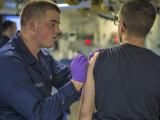Feb 25, 2003 (CIDRAP News) As part of an effort to provide a safer smallpox vaccine, federal health officials today awarded contracts to two companies to develop and test a vaccine using a strain of vaccinia virus that can't reproduce in human cells.
Health and Human Services (HHS) Secretary Tommy Thompson announced that separate contracts totaling up to $20 million were awarded to Bavarian Nordic A/S of Copenhagen, Denmark, and Acambis, Inc., of Cambridge, Mass. Both companies will develop, manufacture, and test a vaccine using modified vaccinia Ankara (MVA), according to an HHS news release.
To protect the nation from the threat of a terrorist release of smallpox, "We need a vaccine that can be safely given to all Americans, including individuals with weakened immune systems, children and pregnant women," Thompson said. "The new contracts will help us meet this need by accelerating research on second-generation smallpox vaccines."
Existing smallpox vaccines are made with live vaccinia virus, which in rare cases can cause serious or life-threatening side effects such as a severe rash or encephalitis. "MVA is a strain of vaccinia that cannot replicate inside human cells and therefore cannot cause dispersed infection," the HHS statement said.
An MVA-based vaccine produced an "excellent safety record" when it was given to 120,000 Germans in the 1970s, HHS reported. But research on MVA ended when smallpox was declared eradicated in 1980,officials said.
The MVA clinical trials in Germany in the 1970s included children, who are at increased risk for complications with the conventional smallpox vaccine, according to Anthony Fauci, MD, director of the National Institute of Allergy and Infectious Diseases (NIAID). In a statement to a Senate committee Jan 30, Fauci also said MVA has been tested recently as a vehicle for delivering HIV and cancer vaccines, and those studies suggest that MVA may be safe in immunocompromised people.
NIAID is administering the new contracts, HHS reported. The contracts require the companies to produce "several thousand doses of their prototype vaccine along with data indicating its effectiveness in animal models" within 6 months. After that, the companies will test the vaccines' safety in healthy adults. "Finally, the companies must develop a plan for large-scale manufacture of the candidate vaccines and show how they could deliver up to 30 million doses to the federal government," the HHS statement said.
In his Senate testimony, Fauci said NIAID is already conducting a clinical trial to assess the safety of MVA and compare the effectiveness of MVA and Dryvax, the conventional smallpox vaccine currently being used to inoculate military personnel and some health workers.
Acambis, Inc., in partnership with Baxter Healthcare Corp., is currently under contract to produce 209 million doses of smallpox vaccine for HHS. The vaccine uses vaccinia virus produced in cell culture rather than grown on the skin of calves, the type used in Dryvax.
In a news release, Acambis said it will collaborate with Baxter Healthcare on the new contract, which it said is worth $9.2 million. NIAID may award funds for additional clinical trials in healthy adults and at-risk groups, which could bring the total value of the contract to an estimated $26.5 million, the company said. Acambis, Inc., is a subsidiary of British-based Acambis plc.
Bavarian Nordic, in its own statement, said it has been developing MVA as a safe smallpox vaccine for the last 3 years and "has already produced a comprehensive package of pre-clinical and clinical data that meets several of the objectives outlined in the US contract." The statement said Bavarian Nordic is the only company that has already completed small-animal studies and a clinical phase I study demonstrating the safety and immunogenicity of MVA in healthy volunteers.
See also:
HHS news release
http://archive.hhs.gov/news/press/2003pres/20030225.html
Anthony Fauci's Jan 30 statement to the Senate
http://www.niaid.nih.gov/news/newsreleases/2003/Pages/smallpoxvacc.aspx


















